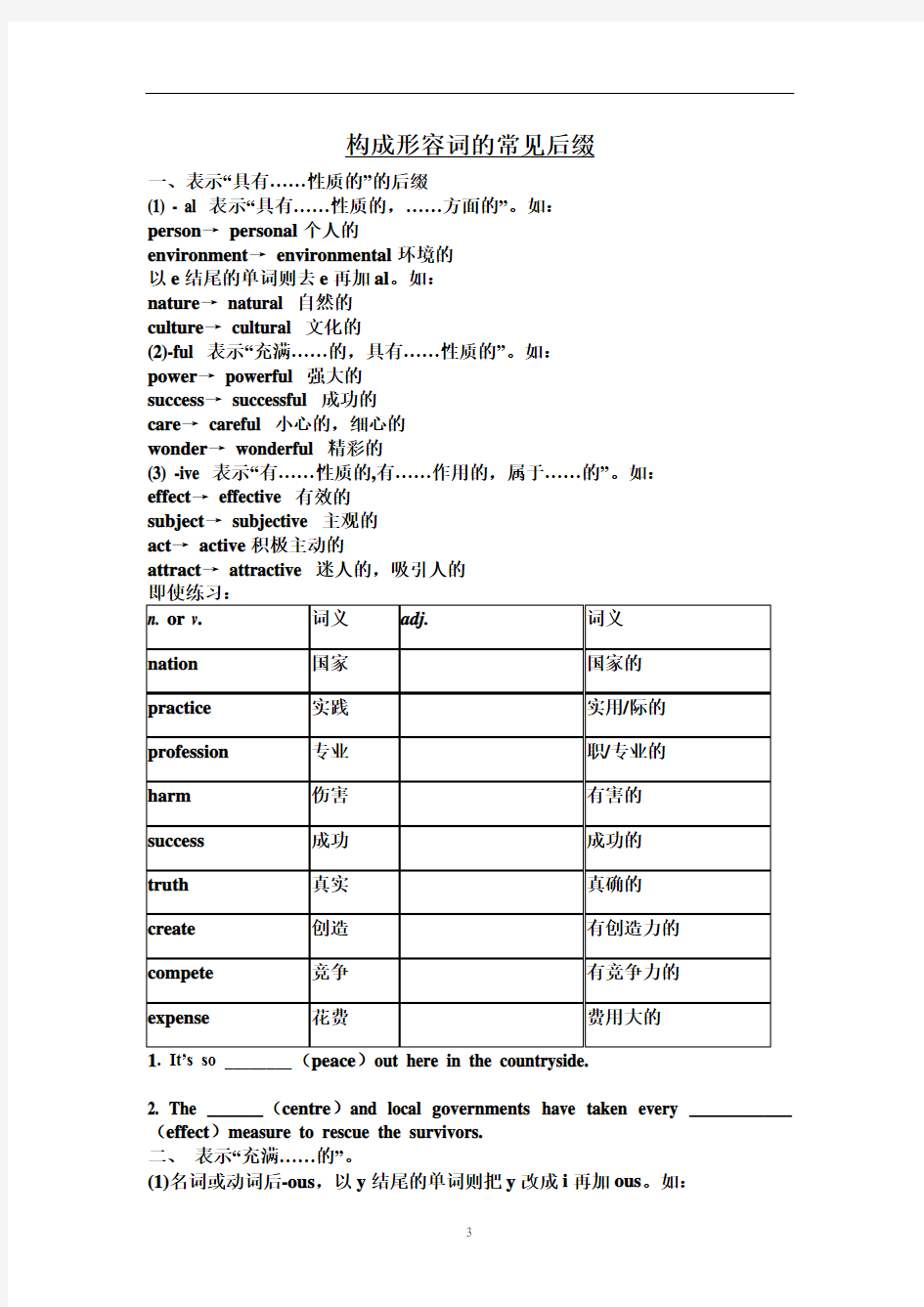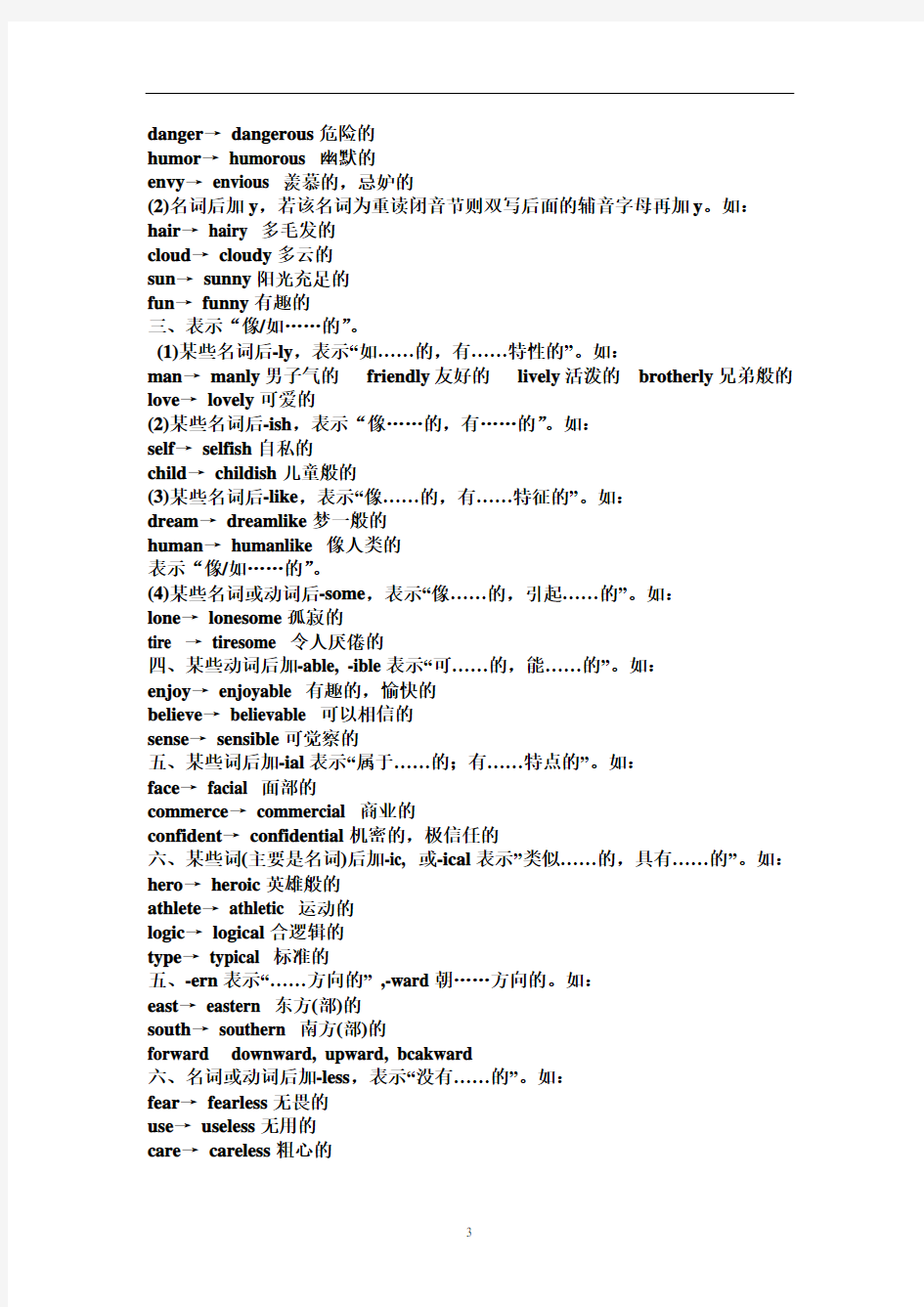构成形容词的常见后缀


构成形容词的常见后缀
一、表示“具有……性质的”的后缀
(1) - al 表示“具有……性质的,……方面的”。如:
person→personal个人的
environment→environmental环境的
以e结尾的单词则去e再加al。如:
nature→natural 自然的
culture→cultural 文化的
(2)-ful 表示“充满……的,具有……性质的”。如:
power→powerful 强大的
success→successful 成功的
care→careful 小心的,细心的
wonder→wonderful 精彩的
(3) -ive 表示“有……性质的,有……作用的,属于……的”。如:
effect→effective 有效的
subject→subjective 主观的
act→active积极主动的
attract→attractive 迷人的,吸引人的
2. The ______(centre)and local governments have taken every ___________(effect)measure to rescue the survivors.
二、表示“充满……的”。
(1)名词或动词后-ous,以y结尾的单词则把y改成i再加ous。如:
danger→dangerous危险的
humor→humorous 幽默的
envy→envious 羡慕的,忌妒的
(2)名词后加y,若该名词为重读闭音节则双写后面的辅音字母再加y。如:hair→hairy 多毛发的
cloud→cloudy多云的
sun→sunny阳光充足的
fun→funny有趣的
三、表示“像/如……的”。
(1)某些名词后-ly,表示“如……的,有……特性的”。如:
man→manly男子气的friendly友好的lively活泼的brotherly兄弟般的love→lovely可爱的
(2)某些名词后-ish,表示“像……的,有……的”。如:
self→selfish自私的
child→childish儿童般的
(3)某些名词后-like,表示“像……的,有……特征的”。如:
dream→dreamlike梦一般的
human→humanlike 像人类的
表示“像/如……的”。
(4)某些名词或动词后-some,表示“像……的,引起……的”。如:
lone→lonesome孤寂的
tire →tiresome 令人厌倦的
四、某些动词后加-able, -ible表示“可……的,能……的”。如:
enjoy→enjoyable 有趣的,愉快的
believe→believable 可以相信的
sense→sensible可觉察的
五、某些词后加-ial表示“属于……的;有……特点的”。如:
face→facial 面部的
commerce→commercial 商业的
confident→confidential机密的,极信任的
六、某些词(主要是名词)后加-ic, 或-ical表示”类似……的,具有……的”。如:hero→heroic英雄般的
athlete→athletic 运动的
logic→logical合逻辑的
type→typical 标准的
五、-ern表示“……方向的” ,-ward朝……方向的。如:
east→eastern 东方(部)的
south→southern 南方(部)的
forward downward, upward, bcakward
六、名词或动词后加-less,表示“没有……的”。如:
fear→fearless无畏的
use→useless无用的
care→careless粗心的
一、写下列单词的形容词性形式。
1. suit 合适的___________
2. value 有价值的___________
3. industry工业的___________
4. north 北部的___________
5. aim 漫无目标的___________
1.Many children were left ________ (home)after the earthquake.
2.I think the reasons he gave for his being late are ____________ (accept).
3.Everyone is ________ (response) for his own behavior.
4.After many years’ hard work,he now lives a _________ (comfort)life.
七、形容词化的分词
(1)现在分词v-ing
will →willing乐意的
miss →missing 失去的
demand →demanding要求高的
(2) 过去分词
skill→skilled熟练的
qualify→qualified有资格的
disable→disabled残疾的
注意:英语中有一类与人的情感有关的动词,它们的形容词形式既有现在分词也有过去分词,但意义略有不同。
tire →tiring 令人疲倦的→tired (感到)疲倦的
please →pleasing 令人高兴的→pleased (感到)高兴的
1. To make myself______, I would do some ________ exercise after work. (relax)
2. All the children felt _________ when they heard the __________ news. (discourage)
3. The professor’s words were so _________ that all his students got _______.
(inspire)
(完整word版)常见形容词词缀
常见形容词词缀 1.-able 以“-able”结尾的形容词一般有两种情况: (1)v.+able→adj. 以这种方式构成的形容词其意义为“能……的”、“可以(被)……的”、“适合于……的”、“值得……的”等,即有被动含义。例如:reliable(可以依靠的),drinkable (可以饮用的),eatable(可食用的)。 (2)n.+able→adj. 这种形容词意为“具有……特点的”,如valuable(有价值的),reasonable (有道理的),comfortable(舒适的)。 2.-ible 该词缀在意义上与“-able”相同,但主要用于拉丁语后。例如:terrible,horrible,invi sible,possible。 3.-al 该词缀大多是加在名词后形成形容词的。不过,有些“-al”后缀则仅体现了该词的形容词性,并非以这种方式构成形容词。“-al”意为“属于……的”、“有……特性的”。这类词在中学英语中颇多,如actual,general,international,medical,mental,moral,natural,official,several,special,usual。(这类形容词大部分没有比较级和最高级) 4.-an “-an”加在国名、地名之后,表明是相应的形容词,如American,African。 5.-ian “-ian”与“-an”相同。例如:Asian,Australian,Canadian,Indian,Italian。 6.-ant “-ant”表示“……性的”。带“-ant”后缀的形容词其相应名词往往是-ance或-ancy 后缀。例如:instant(instance),distant(distance),important(importance),brilliant(brilliancy),consta nt(constancy),pleasant。 7.-ent “-ent”与“-ant”非常相似。例如:absent(absence),different(difference),excelle nt(excellence),patient(patience),present(presence). 8.-ar “-ar”意为“……的”、“……性的”,如popular,particular,regular。 9.-ary “-ary”意为“……的”、“与……有关的”。例如:contrary,necessary,ordinary,prim ary,revolutionary。 10.-ed “-ed”加在动词之后形成形容词。实际上该形容词是由原动词的过去分词演变而来的,因此它有被动含义。这种形容词在中学英语中出现很多,有connected,discouraged,disappointed,engaged,exc ited,interested,limited,married,pleased,tired,united,used(习惯的),worried,wounded。 “-ed”也可加在动词之后形成复合形容词,如man-made,water-covered。 “-ed”还可加在名词之后形成复合形容词,如warm-hearted,warm-blooded,three-legged。11.-en “-en”有两种情况: (1)“-en”跟在一些物质名词之后构成形容词,表示“材料”或“质地”,如wooden,golden,earthe n。 (2)“-en”也可加在一些不规则动词之后形成形容词。这些形容词实际上是由过去分词转换而来的。例如:spoken,written,stricken,mistaken。 12.-ern “-ern”加在表示方位的名词之后,表示“……(方位)的”。这样的词有eastern,sout hern,western,northern等。 13.-ese “-ese”加在国名、地名之后构成相应形容词。例如:Chinese,Japanese. 14.-ful 这一后缀有两种情况: (1)加在名词之后构成形容词,表示“充满……的”、“有……性质的”,如beautiful,colourful,he lpful,powerful,successful,useful,wonderful。 (2)加在动词之后,所构成的形容词意为“易于……的”,如forgetful。 15.-ic “-ic”常常加在名词或依附于词干后,构成形容词,意为“……的”、“……似的”、
英语名词形容词动词后缀
名词后缀 (1)具有某种职业或动作的人 1)-an, -ain, 表示"……地方的人,精通……的人“American, historian, 2)-al, 表示"具有……职务的人" principal, 3)-ant,-ent, 表示"……者“merchant, agent, servant, student, 4)-ar, 表示"……的人“scholar, liar, peddler 5)-ard, -art, 表示"做……的人“coward, laggard, braggart(夸张者) 6)-arian, 表示"……派别的人,……主义的人“humanitarian, vegetarian 7)-ary, 表示"从事……的人" secretary, missionary 8)-ant, 表示"具有……职责的人" candidate, graduate 9)-ator, 表示"做……的人" educator, speculator(投机者) 10)-crat, 表示"某种政体,主义的支持者" democrat, bureaucrat 11)-ee, 表示"动作承受者" employee, examinee 12)-eer, 表示"从事于……人" engineer, volunteer 13)-er, 表示"从事某种职业的人, 某地区,地方的人" banker, observer, Londoner, villager 14)-ese, 表示" ……国人,………地方的人“Japanese, Cantonese 15)-ess, 表示"阴性人称名词,actress, hostess, manageress 16)-eur, 表示"……家“amateur, littérateur 17)-ian, 表示"……地方人,信仰…….教的人,从事……职业的人“Christian, physician(内科医生),musician 18)-ician, 表示"精通者,……家,“electrician, magician, technician 19)-icist, 表示"……家,…….者, …….能手“physicist, phoneticist, technicist 20)-ic, 表示"……者,……师" mechanic, critic 21)-ie, 表示"爱,指小" dearie, auntie, lassie(小姑娘) 22)-ier, 表示"从事……职业“cavalier, clothier, brazier(黄铜匠) 23)-ine, ian, 表示"阴性人称" heroine, ballerina 24)-ist, 表示"从事……研究者,信仰……主义者" pianist, communist, dentist, artist, chemist 25)-ive, 表示"动作者,行为者“native, captive 26)-logist, 表示"……学家,研究者" biologist, geologist(地质学家) 27)-or, 表示"……者" author, doctor, operator, 28)-ster, 表示"做…….事情的人“youngster, gamester(赌徒),songster 29)-yer, 表示" 从事……职业者“lawyer (2). 构成,具有抽象名词的含义本文 1)-acy, 表示"性质,状态,境遇" accuracy, diplomacy 2)-age, 表示"状态,行为,身份及其结果,总称" courage, storage, marriage 3)-al, a)表示"事物的动作,过程“refusal, arrival, survival, denial, approval b)表示具体的事物manual, signal, editorial, journal 4)-ance, -ence表示"性质,状况,行为,过程,总量,程度“endurance, importance, diligence, difference, obedience 5)-ancy, -ency, 表示"性质,状态,行为,过程" frequency, urgency, efficiency, 6)-bility, 表示"动作,性质,状态" possibility, feasibility, 7)-craft, 表示"工艺,技巧“woodcraft, handicraft, statecraft(治国策) 8)-cracy, 表示"统治,支配" bureaucracy, democracy 9)-cy, 表示"性质,状态,职位,级别" bankruptcy(破产),supremacy 10)-dom, 表示"等级,领域,状态" freedom, kingdom, wisdom 11)-ery, -ry, 表示"行为,状态,习性" bravery, bribery, rivalry 12)-ety, 表示"性质,状态“variety, dubiety(怀疑) 13)-faction, -facture, 表示"作成,……化,作用" satisfaction, manufacture 14)-hood, 表示"资格,身份, 年纪,状态" childhood, manhood, falsehood 15)-ice, 表示"行为,性质,状态" notice, justice, service 16)-ine, 表示"带有抽象概念" medicine, discipline, famine 17)-ing, 表示"动作的过程,结果" building, writing, learning 18)-ion, -sion, -tion, -ation, -ition, 表示"行为的过程,结果,状况" action, solution, conclusion, destruction, expression, 19)-ise, 表示"性质,状态“exercise, merchandise(商业) 20)-ism, 表示"制度,主义,学说,信仰,行为" socialism, criticism, colloquialism, heroism 21)-ity, 表示"性质,状态,程度“purity, reality, ability, calamity 22)-ment, 表示"行为,状态,过程,手段及其结果treatment, movement, judgment, punishment, argument 23)-mony, 表示"动作的结果,状态" ceremony, testimony 24)-ness, 表示"性质,状态,程度" goodness, kindness, tiredness, friendliness
初中 最常见词根词缀总结
初中常用词根词缀总结 前缀 1、ab--表示反常,否定,离开abnormal absent 2、ante--在.......之前anteroom antecedent 3、anti--防止,反对antiwar antifreeze 4、auto--自动的automobile autorun 5、bi--两个,双bicycle bilateral 6、co--一起,共同cooperate coexist 7、com--一起,共同combine compete 8、contra--相反contrast contradict 9、de--往下,离开,减少decrease devalue 10、dis--表示否定dislike disappear 11、ex--向外,以前的export ex-wife 12、extra--超过extraordinary 13、fore--在......之前forehead foresee 14、hemi--一半hemisphere hemicycle 15、homo--相同的homosexual 16、il--表示否定illegal illiterate 17、im--表示否定impossible impolite 18、in--表示向内,也表否定indoor independent 19、inter--在.......之间,彼此international interchange 20、ir--表示否定irregular irrelative 21、kilo--千(构成名词,常用于计量单位)kilometer kilogram 22、mid--中,中部midnight midlife 23、mini--小的,迷你的miniskirt ministate 24、mis--坏的,错误misuse mistake 25、non--表示否定nonstop nonhuman 26、out--外面,超过outgoing outsize 27、over--过度,覆盖overwork overcoat 28、pre--在........之前prehistory preschool 29、re--重复,重新rebuilt reconsider 30、step--后,继的stepfather stepchild 1
形容词后缀大全
(1)带有“属性,倾向,相关”的含义 1)-able, -ible, movable, comfortable, applicable, visible, responsible 2)-al, natural, additional, educational 3)-an, ane, urban, suburban, republican 4)-ant, -ent, distant, important, excellent 5)-ar, similar, popular, regular 6)-ary, military, voluntary 7)-ice, -atie, ical, politic, systematic, historic, physical, 8)-ine, masculine, feminine, marine 9)-ing, moving, touching, daring 10)-ish, foolish, bookish, selfish 11)-ive, active, impressive, decisive 12)-ory, satisfactory, compulsory 13)-il, -ile, -eel, fragile, genteel(文雅的) (2) 表示“相象,类似”的含义 1)-ish, boyish, childish 2)-esque, picturesque 3)-like, manlike, childlike 4)-ly, manly, fatherly, scholarly, motherly 5)-some, troublesome, handsome 6)-y, milky, pasty (3) 表示“充分的”含义 1)-ful, beautiful, wonderful, helpful, truthful 2)-ous, dangerous, generous, courageous, various 3)-ent, violent
人教版高中英语构词法讲义(13)构成名词的常见后缀3
构词法(13)构成名词的常见后缀 3 即时练习 一、按要求写出下列词的适当形式 二、用下列句中所给词的正确形式填空 1. This stair should only be used in an _________. (emergent) 2. Waiting for exam results is a time of great _________. (anxious) 3. Fresh fruits and vegetables can provide much of our daily ______________. (require)
4. After a long _________ (argue), we decided when to leave. 5. It is your _______ (free) to do what you want after class. 6. With a little more ________ (practical), you will be able to pass your test. 7. It won’t make much ________ (differ) whether you have finished your task or not. 8. His _________ (patient) made me very angry. 9. Most of the artist are full of _________ (imagine), so they often can draw something to attract us. 10. Just keep doing it, I am sure you will turn all your dreams into ________ (real) one day. 11. As is known to us all, the Entrance Exam is a great _________, and the students are the __________. (compete) 12. His _______ (kind) is known to us all, so when our classmates have something in trouble, we often ask him for help. 13. Now China has been a great developing country, and a lot of people in the other countries can speak _________. (China) 答案: 一、按要求写出下列词的适当形式 1.preference 2. society 3. preparation 4. laziness 5. solution 6. invitation 7. achievement 8. adjustment 9. participant 10. inventor 11. cyclist 12. brotherhood 13. tendency 14. poverty 15. privacy 二、用下列句中所给词的正确形式填空 1. emergency 2. anxiety 3. requirement 4. argument 5. freedom
26种英语形容词后缀讲解
26种英语形容词后缀讲解 ◆-able 以“-able”结尾的形容词一般有两种情况: (1)v.+able→adj. 以这种方式构成的形容词其意义为“能……的”、“可以(被)……的”、“适合于……的”、“值得……的”等,即有被动含义。例如:reliable(可以依靠的),drinkable (可以饮用的),eatable(可食用的)。 (2)n.+able→adj. 这种形容词意为“具有……特点的”,如valuable(有价值的),reasonable(有道理的),comfortable (舒适的)。 ◆-ible 该词缀在意义上与“-able”相同,但主要用于拉丁语 后。例如:terrible,horrible,invi sible,possible。 ◆-al 该词缀大多是加在名词后形成形容词的。不过,有些“-al”后缀则仅体现了该词的形容词性,并非以这种方式构成形容词。“-al”意为“属于……的”、“有……特性的”。这类词在中学 英语中颇多,如 actual,general,international,medical,mental,moral,natural, official,several,special,usual。(这类形容词大部分没有比较 级和最高级) ◆-an “-an”加在国名、地名之后,表明是相应的形容词,如 American,African。 ◆-ian “-ian”与“-an”相同。例如: Asian,Australian,Canadian,Indian,Italian。
◆-ant “-ant”表示“……性的”。带“-ant”后缀的形容词其相 应名词往往是-ance或-ancy后缀。例如:instant(instance),distant(distance),important(importance), brilliant(brilliancy),consta nt(constancy),pleasant。 ◆-ent “-ent”与“-ant”非常相似。例如: absent(absence),different(difference),excelle nt(excellence),patient(patience),present(presence). ◆-ar “-ar”意为“……的”、“……性的”,如 popular,particular,regular。 ◆-ary “-ary”意为“……的”、“与……有关的”。例如: contrary,necessary,ordinary,prim ary,revolutionary。 ◆-ed “-ed”加在动词之后形成形容词。实际上该形容词是由原动词的过去分词演变而来的,因此它有被动含义。这种形容 词在中学英语中出现很多,有 connected,discouraged,disappointed,engaged,exc ited,interested,limited,married,pleased,tired,united,used (习惯的),worried,wounded。 “-ed”也可加在动词之后形成复合形容词,如 man-made,water-covered。 “-ed”还可加在名词之后形成复合形容词,如 warm-hearted,warm-blooded,three-legged。 ◆-en “-en”有两种情况:
英语常见名词后缀(最全)
名词后缀 一、具有某种职业或动作的人 1)-an,-ian,表示"……地方的人,精通……的人”American,historian, 2)-al,表示"具有……职务的人" principal, 3)-ant,-ent,表示"……者” merchant,agent,servant,student, 4)-ar,表示"……的人” scholar,liar,peddler 5)-ard,-art,表示"做……的人”coward,laggard,braggart(夸张者) 6)-arian,表示"……派别的人,……主义的人”humanitarian,vegetarian 7)-ary,表示"从事……的人" secretary,missionary 8)-ate,表示"具有……职责的人" candidate,graduate 9)-ator,表示"做……的人" educator,speculator(投机者) 10)-crat,表示"某种政体,主义的支持者" democrat,bureaucrat 11)-ee,表示"动作承受者" employee,examinee 12)-eer,表示"从事于……人" engineer,volunteer 13)-er,表示"从事某种职业的人,某地区,地方的人" banker,observer,Londoner,villager 14)-ese,表示" ……国人,…..地方的人”Japanese,Cantonese 15)-ess,表示"阴性人称名词,actress,hostess,manageress 16)-eur,表示"……家” amateur,littérateur 17)-ian,表示"……地方人,信仰…….教的人,从事……职业的 人”Christian,physician(内科医生),musician 18)-ician,表示"精通者,……家,”electrician,magician,technician 19)-icist,表示"……家,…….者,…….能手”physicist,phoneticist,technicist 20)-ic,表示"……者,……师" mechanic,critic 21)-ie,表示"爱,指小" dearie,auntie,lassie(小姑娘) 22)-ier,表示"从事……职业” cavali er,clothier,brazier(黄铜匠) 23)-ine,ian,表示"阴性人称" heroine,ballerina 24)-ist,表示"从事……研究者,信仰……主义者" pianist,communist,dentist,artist,chemist 25)-ive,表示"动作者,行为者” native,captive 26)-logist,表示"……学家,研究者" biologist,geologist(地质学家) 27)-or,表示"……者" author,doctor,operator, 28)-ster,表示"做…….事情的人”youngster,gamester(赌徒),songster 29)-yer,表示" 从事……职业者” lawyer
形容词后缀大全以及词例教学文案
形容词后缀大全以及 词例
形容词后缀大全以及词例 1.-able 表示“可…的,能…” 【例】 knowable ['n?u?bl] adj. 可知的 inflammable [?n'fl?m?b(?)l] adj. 易燃的(inflame点燃)conceivable [k?n'si?v?b(?)l] adj. 想象得出的(conceive 设想,想象) 2.-aceous 表示“具有…特征的” 【例】 herbaceous [h??'be???s] adj. 草本植物的(herb草) curvaceous [k??'ve???s] adj. 有曲线美的(curve曲线) foliaceous [,f??l?'e???s] adj. 叶状的(foli 叶+aceous;参考:foliage树叶) 3.-acious 表示“有特征的,多…的” 【例】 sagacious [s?'ge???s] adj. 睿智的(sage智者)
capacious [k?'pe???s] adj. 宽敞的(cap能→的+acious;参考:capble 有能力的) fallacious [f?'le???s] adj. 错误的(fall错;参考:fallacy谬误) 4.-al 表示“…的” 【例】 personal ['p??s(?)n(?)l] adj. 个人的(person人) continertal [k?nt?'nent(?)l] adj. 大陆的(contonent大陆)exceptional [?k'sep?(?)n(?)l] adj. 例外的(exception例外) 5.-an 可表名词和形容词,“…地方,.…人 【例】 American [?mer?k?n] adj. 美洲的 n. 美洲人 republican [r?'p?bl?k(?)n] adj. 共和国的 n.共和党人 suburban [s?'b??b(?)n] adj. 郊区的 6.-aneors 表示“…有;…特征的” 【例】 simultaneous [,s?m(?)l'te?n??s] adj. 同时发生的
形容词性后缀
后缀通常改变词性,构成意思相近的其它词性的词;少数后缀同时会改变词义。 A.形容词性后缀: 例:nation→national 民族的,国家的;nature→natural 自然的 equal平等的;special特别的;central中心的;agricultural农业的;electrical电的;facial面部的;fundamental 基本的;global全球的;personal个人的;racial种族的;spiritural精神的;theoretical理论的;typical典型的;mental心理的,智力的 表示“有能力的”例:eat→eatable 能吃的 adjustable: adjust (v. 调节) + -able àadj. “able to be adjusted可调节的”; respectable: respect(v. 尊敬) + -able àadj. “able to be respected可敬的”; adaptable: suit(v. 使适应) + -able àadj. “able to be adapted 可适应的”; 2.-able 加在“变形动词”的后面 applicable: apply(v. 应用) + -able àadj. “可应用的” deniable: deny(v. 否认) + -able àadj. “可否认的” triable: try(v. 尝试) + -able àadj. “可试验的” usable: use(v. 使用) + -able àadj. “可用的,合用的” 3.-able 有时与名词结合,表示“给予…的”,“值得…的” fashionable adj. 时尚的,时髦的 lovable adj. 可爱的 reasonable adj. 合理的 4. –able 后面加上不及物动词,构成的形容词有主动含义 agreeable: agree(vi.同意) + -able àadj. 欣然同意的,惬意的 reliable: rely(vi.依靠) + -able àadj. 可靠的 shrinkable: shrink(vi.缩水) + -able àadj. 会收缩的 variable: vary(vi.变化) + -able àadj. 可变化的 5. –able 加在词根后面 capable: cap-(to hold) + -able àadj. 有能力的 durable: dur-(to last持续) + -able àadj. 持久的 6. –ible 加上“动词词根”构成形容词 tangible: tang-(/tact- = to touch) + -ible àadj. that can be perceived by touch可触摸的visible: vis(= to see) + -ible àadj. that can be seen 可见的 terrible: terr(= to frighten) + -ible àadj. that can be frightened 可怕的 negligible: neglig(=neglect 忽略) + -ible àadj. that can be neglected 可忽略的 ian 表示“国家的,国家人的”。例:America→American 美国(人)的African(非洲人),American (美国人),Asian(亚洲人),Japanese(日本人),Chinese(中国人) 表示“方向的”。例:east→eastern东方的,south→southern南方的 northeastern a. 东北方的,在东北的,来自东北的northern a.北方的,北部的northwestern a. 在西北部的,西北方的,来自西北的southeastern a. 东南方的southern adj.南方的,南部的southwestern 例:beauty→beautiful 美丽的,care→careful 小心的 awful糟糕的可怕的wonderful好极的,精彩的careful小心的helpful有帮助的 useful有用的meaningful 有意义的beautiful漂亮的
组常见名词后缀
14组常见的名词后缀以及例词 (考纲版) 1.以ment结尾的名词achievement n. 完成,成绩advertisement n. 广告adjustment n. 整理,调整agreement n. 同意,一致;协定,协议 amusement n. 娱乐 apartment n. (美)楼中单元房,一套房间;房间 appointment n. 约会 argument n. 争论,辩论arrangement n. 安排,布置assessment n. 评定 basement n. 地下室 commitment n. 承诺 development n. 发展,发达,发育,开发 disagreement n. 意见不一致;相违;争论 encouragement n. 鼓励entertainment n. 娱乐 equipment n. 装备,设备government n. 政府 judg(e)ment n. 裁判 movement n. 运动,活动punishment n. 惩罚 requirement n. 需要;要求;必要的条件 settlement n. 新拓居地;(美)部落,村落 statement n. 声明,报告treatment n. 治疗,疗法unemployment n. 失业,失业状态 2.以~age结尾的抽象名词marriage n. 结婚,婚姻 package n. (尤指包装好或密封的容器)一包,一袋,一盒 percentage n. 百分率 postage n. 邮费 storage n. 贮藏;储存 3.以cy结尾的名词 accuracy n. 精确 agency n. 代理 currency n. 货币;现金 (current adj.现在的;流通的)emergency n. 紧急情况或状态fluency n. 流利 4.以ance结尾的名词acquaintance n. 泛泛之交allowance n. 津贴 appearance n. 出现,露面;容貌assistance n. 援助 entrance n. 入口;入场;进入的权 guidance n. 引导,指导insurance n. 保险 performance n. 演出,表演 5.以ence结尾的名词preference n. 选择,趋向
名词变形容词的十大规律
r s o 名词变形容词的十大规律 英语中,有时在名词之前或末尾加上不同的前缀或后缀就可以变为形容词。 如: sleep (睡觉) →asleep (睡着的) →sleepy (瞌睡的) help (帮助)→helpful (有帮助的) 下面将名词变为形容词的构成方法归纳如下: 一、 名词加“-y”构成形容词。如: rain (雨水) →rainy (多雨的) wind (风) →windy (多风的,风大的) cloud (云) →cloudy (多云的,阴天的) snow (雪)→ snowy (多雪的) sun (太阳)→ sunny (多阳光的,明朗的) [特别提醒:别忘了双写n] 以一个辅音字母结尾的重读闭音节结尾,须双写最后一个辅音字母。 luck (运气)→ lucky (幸运的) noise (嘈杂声) →noisy (嘈杂的,喧闹的) [特别提醒:别忘了去掉e]
以不发音的“e”结尾,须去掉“e”。 health (健康)→healthy(健康的) 二、名词加"-ful"构成形容词,表示肯定。如: use (使用)→useful(有用的) help (帮助)→helpful(有帮助的) harm (伤害,损害)→harmful(有害的) forget (忘记)→forgetful(健忘的) beauty (美丽)→beautiful(美丽的) [特别提醒:别忘了把-y变成-i,再加-ful] 辅音字母加“y”结尾,先改“y”为“i”。 care (关心,小心)→careful(小心的,仔细的)pain (疼痛)→painful(疼痛的) wonder (惊奇,想知道)→wonderful(极好的)color (颜色)→colorful(彩色的;色彩艳丽的)thank (感谢)→thankful(感激的,欣赏的)
常用英语形容词后缀
形容词后缀(1)带有"属性,倾向,相关"的含义 1) -able, -ible, movable, comfortable, applicable, visible, responsible 可移动的舒服的适当可应用明显可得到责任心 2) -al, natural, additional, educational, physical, 自然天生额外附加教育身体自然界 3) -an, ane, urban, suburban, republican 都市城郊土气共和国政体 4) -ant, -ent, distant, important, excellent 遥远冷漠不清晰重要卓越 5) -ar, similar, popular, regular 相似受欢迎规律 6) -ary, military, voluntary 军事好战自愿有意 7) -ice, -atie, ical, politic, systematic, historic, 谨慎有见识系统一贯历史 8) -ine, masculine, feminine, marine 有男子气概女孩子气海产海军 9) -ing, moving, touching, daring 感动可移动同情感人胆大意气风发勇敢 10) -ish, foolish, bookish, selfish, boyish, childish 愚蠢好学书呆子自私男孩子气孩子气 11) -ive, active, impressive, decisive 积极好动印象深刻决断坚决 12) -ory, satisfactory, compulsory 令人满意强制性;义务的必修 13) -il, -ile, -eel, fragile, genteel 表示"相象,类似"的含义 易碎脆弱文雅的;有礼貌的;有教养的;上流社会 2) -esque, picturesque 3) -like, manlike, childlike 4) -ly, manly, fatherly, scholarly, motherly 5) -some, troublesome, handsome 6) -y, milky, pasty 表示"充分的"含义 1) -ful, beautiful, wonderful, helpful, truthful 2) -ous, dangerous, generous, courageous, various 3) -ent, violent, 表示由某种物质形成,制成或生产的含义 1) -en, wooden, golden, woolen
英语常见名词后缀
英语常见词缀 -名词后缀 一、构成具有抽象名词的含义 序 后缀 意义 号 1 -acy 性质,状态,境遇 2 -age 状态,行为,身份及其结果, 总称 3 -al 事物的动作,过程 表示具体的事物 4 -ance, -ence 性质,状况,行为,过程,总量,程度 5 -ancy, -ency 性质,状态,行为,过程 6 - bilit y 动作,性质,状态 7 - craft 工艺,技巧 8 - cracy 统治,支配 9 -cy 性质,状态,职位,级别 10 -dom 等级,领域,状态 11 -ery, -ry 行为,状态,习性 12 -ety 性质,状态 13 -faction, 作成, ?? 化,作用 - factu re 14 -hood 资格,身份 , 年纪,状态 15 -ice 行为,性质,状态 16 -ine 带有抽象概念 17 -ing 动作的过程,结果 18 -ion, -sion, 行为的过程,结果,状况 -tion, - atio n, - ition 19 -ise 性质,状态 20 -ism 制度,主义,学说,信仰, 行为 21 -ity 性质,状态,程度 22 -ment 行为,状态,过程,手段及 其结果 23 -mony 动作的结果,状态 24 -ness 性质,状态,程度 25 -or, -our 动作,性质,状态 26 - osity 动作,状态 27 -ship 情况,性质,技巧,技能及
举例 dependence,accordance, avoidance, performance, finance, correspondence, evidence, application, consideration, comprehension, promotion, encouragement, contribution, implication, generation, succession, prediction, consumption, reflection, limitation, involvement, Criticism, popularity, necessity, variety, Replacement, statement, management, Behavior,
形容词后缀大全以及词例
形容词后缀大全以及词例 表示“可…的,能…” 【例】 knowable ['n?u?bl] adj. 可知的 inflammable [?n'fl?m?b(?)l] adj. 易燃的(inflame点燃)conceivable [k?n'si?v?b(?)l] adj. 想象得出的(conceive 设想,想象) 表示“具有…特征的” 【例】 herbaceous [h??'be???s] adj. 草本植物的(herb草)curvaceous [k??'ve???s] adj. 有曲线美的(curve曲线)foliaceous [,f??l?'e???s] adj. 叶状的(foli 叶+aceous;参考:foliage树叶) 表示“有特征的,多…的” 【例】 sagacious [s?'ge???s] adj. 睿智的(sage智者)
capacious [k?'pe???s] adj. 宽敞的(cap能→的+acious;参考:capble有能力的) fallacious [f?'le???s] adj. 错误的(fall错;参考:fallacy谬误) 表示“…的” 【例】 personal ['p??s(?)n(?)l] adj. 个人的(person人)continertal [k?nt?'nent(?)l] adj. 大陆的(contonent大陆) exceptional [?k'sep?(?)n(?)l] adj. 例外的(exception 例外) 可表名词和形容词,“…地方,.…人 【例】 American [?mer?k?n] adj. 美洲的 n. 美洲人republican [r?'p?bl?k(?)n] adj. 共和国的 n.共和党人 suburban [s?'b??b(?)n] adj. 郊区的
